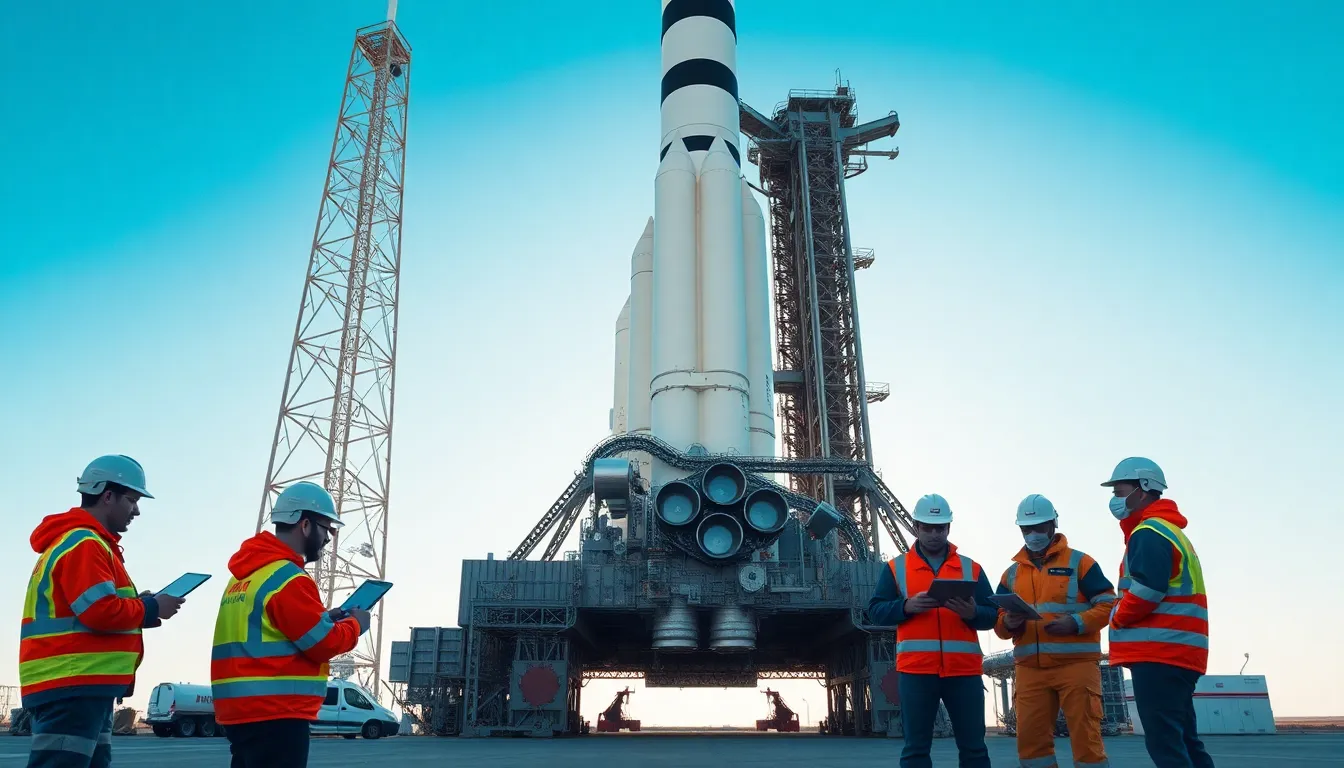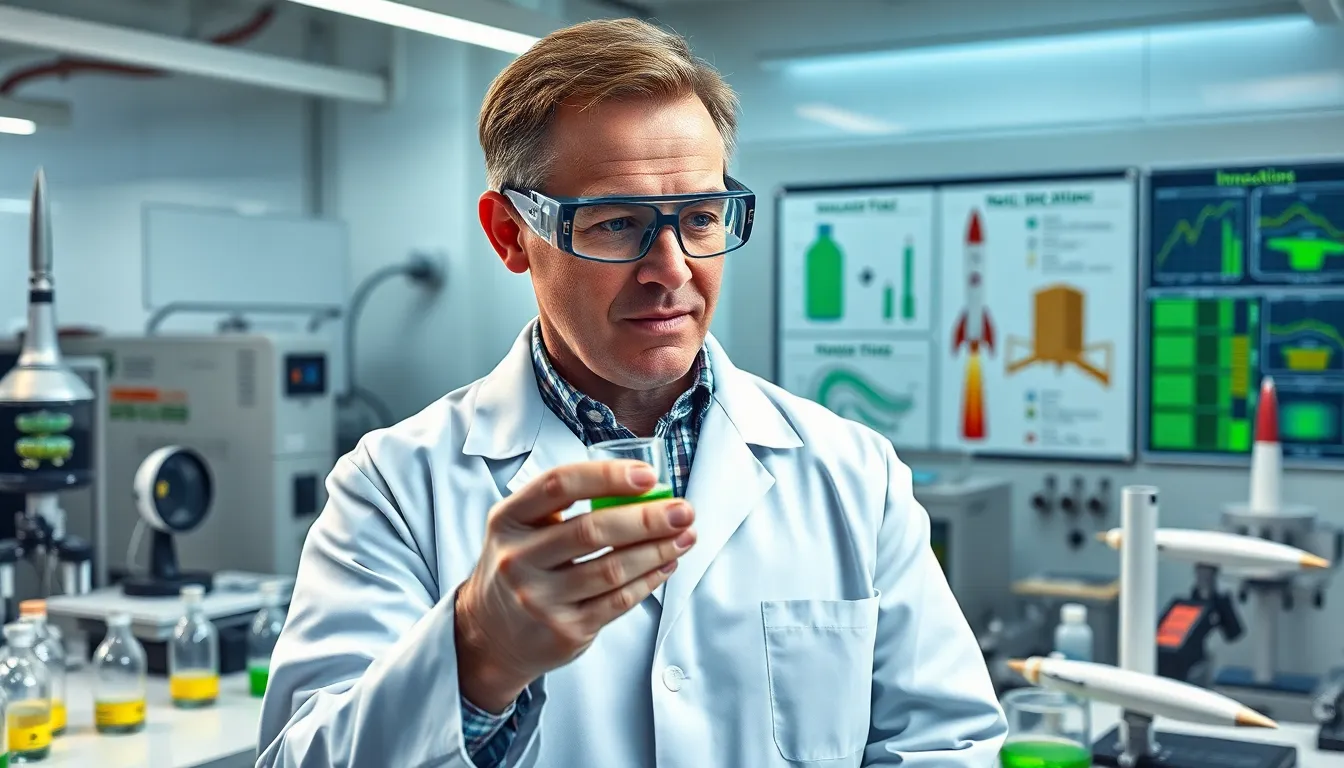The world of space exploration is on the brink of a revolution, driven by groundbreaking innovations in rocket fuel technology. As the demand for more efficient and sustainable space travel grows, scientists and engineers are tirelessly working to develop fuels that not only enhance performance but also minimize environmental impact.
From advanced propellants to hybrid systems, these innovations promise to reshape the future of aerospace travel. They’re not just about reaching new heights; they’re about making space accessible and sustainable for generations to come. As we delve into the latest advancements in rocket fuel, it’s clear that the next frontier of exploration is fueled by creativity and ingenuity.
Table of Contents
ToggleOverview of Rocket Fuel Innovations
Rocket fuel innovations focus on creating more efficient, sustainable, and powerful propellants. Scientists and engineers pursue various new technologies, enhancing propulsion systems and minimizing environmental footprints.
Types of Rocket Fuels
- Liquid Propellants:
- Liquid oxygen (LOX) combined with liquid hydrogen (LH2) represents a clean and efficient option.
- Hypergolic fuels, such as hydrazine and nitrogen tetroxide, provide immediate ignition, simplifying engine design.
- Solid Propellants:
- Composite solid fuels consist of oxidizers and binders, offering high energy density.
- Hybrid propellants blend liquid oxidizers with solid fuels, balancing performance with safer handling.
- Green Propellants:
- Non-toxic alternatives, like LMP-103S and AF-M315E, demonstrate lower environmental impacts and are safer for both launches and storage.
- These propellants gain attention for their potential in reducing harmful emissions during missions.
Advancements in Hybrid Systems
Hybrid propulsion systems merge the advantages of solid and liquid fuels. These systems improve efficiency, allow for adjustable thrust, and enhance safety. Technologies like the SpaceShipTwo utilize hybrid engines, providing valuable data for future spacecraft.
Innovations in Additives and Enhancements
Innovative additives improve combustion efficiency and overall performance. Nanoparticles enhance energy release and can significantly increase thrust capabilities. Research into new chemical formulations continues to expand the range of effective propellants.
Environmental Considerations
Environmental sustainability drives the development of new fuels. Rocket launches contribute to atmospheric pollution; thus, innovations aim to reduce toxic emissions. By adopting green propellants, the aerospace industry prepares for a cleaner approach to exploration.
Future Prospects
The future of rocket fuel innovations signals exciting opportunities for space exploration. Continuous advancements in material science and combustion methods promise enhanced performance. These innovations will likely facilitate longer missions, deeper space travel, and increased accessibility to outer space.
Types of Rocket Fuel Innovations

Innovations in rocket fuel types significantly impact the efficacy and sustainability of space missions. Three primary categories define these advancements: solid, liquid, and hybrid rocket fuels.
Solid Rocket Fuels
Solid rocket fuels consist of a pre-composed mixture that ignites to produce thrust. They offer advantages like high energy density, simplified storage, and reliability. Notable examples include:
- Composite propellants: Combine oxidizers and fuels into a solid matrix, enhancing performance.
- Metalized propellants: Incorporate metals, like aluminum, to boost energy efficiency.
- Low-cost manufacturing: Simplifies production and reduces overall mission costs.
Solid fuels also feature long shelf life and instant thrust availability, making them ideal for various applications, including military and space launch vehicles.
Liquid Rocket Fuels
Liquid rocket fuels provide the ability to control thrust levels accurately. They utilize separate components that mix before combustion, enhancing performance. Key attributes include:
- High efficiency: Fuels like liquid oxygen (LOX) and liquid hydrogen (LH2) offer excellent specific impulse.
- Restart capability: Engines can be shut down and restarted, enabling complex maneuvers.
- Adaptability: Liquid fuels can mix various propellants, optimizing mission requirements.
These fuels’ cleanliness during combustion contributes to reduced environmental impact, making them a preferred choice for many modern rockets.
Hybrid Rocket Fuels
Hybrid rocket fuels combine both solid and liquid components for propulsion. This innovative approach merges the benefits of both fuel types, displaying features such as:
- Enhanced safety: Liquid oxidizers reduce the risk of accidental ignition.
- Thrust control: Operators can adjust liquid flow to modify thrust levels.
- Simplicity: Manufacturing and integration processes are streamlined compared to fully liquid systems.
Hybrid systems offer great potential for future space missions, balancing reliability with performance while minimizing ecological footprints.
Recent Breakthroughs in Rocket Fuel Technology
Recent developments in rocket fuel technology focus on sustainability and innovation. Researchers aim to create eco-friendly alternatives and optimize production methods for greater efficiency.
Sustainable Fuel Sources
Sustainable fuel sources play a crucial role in modern rocket propulsion. Biofuels are emerging as viable options, offering reduced carbon footprints without compromising performance. Examples include bioethanol and biodiesel, derived from renewable materials like agricultural waste and algae. Additionally, innovative green propellants, such as LMP-103S and AF-M315E, meet lower toxicity standards while maintaining high energy efficiency. These fuels contribute to a significant decrease in emissions, aligning with global environmental goals while advancing space exploration capabilities.
Advanced Manufacturing Techniques
Advanced manufacturing techniques enhance the production and performance of rocket fuels. 3D printing, for instance, allows for precise component creation, leading to optimized fuel injector designs and reduced material waste. This method also enables rapid prototyping, facilitating experimentation with new propellant formulations. Another significant advancement includes the use of additive manufacturing to manufacture complex geometries for rocket engines, improving fuel flow and combustion efficiency. These innovations streamline production processes, reduce costs, and ultimately contribute to safer, more reliable rocket fuel technologies.
The Impact of Innovations on Space Exploration
Innovations in rocket fuel technology significantly enhance space exploration capabilities. Efficient propulsion systems empower spacecraft to achieve higher velocities and travel longer distances. Improved fuel options democratize access to space, making missions feasible for various organizations, including commercial entities and governmental agencies.
New propellant formulations address environmental concerns by producing fewer emissions compared to traditional fuels. Green propellants like LMP-103S exemplify this shift, reducing toxicity and enhancing safety. These environmentally friendly alternatives facilitate sustainable practices in aerospace operations.
Hybrid propulsion systems further transform space travel. Their ability to synergize solid and liquid fuels showcases remarkable adaptability and performance. Enhanced safety measures derived from their design mitigate risk during launches, supporting ambitious exploration goals.
Innovative additives, including nanoparticles, elevate combustion efficiency and thrust across various fuel types. Their incorporation leads to more powerful rockets, allowing for payloads to reach critical destinations like Mars and beyond.
Sustainable fuel sources, such as biofuels made from agricultural waste and algae, emerge as key players in aerospace innovation. These renewable materials lower carbon outputs while maintaining performance standards, reinforcing commitments to environmental stewardship.
Advanced manufacturing techniques, including 3D printing, optimize rocket component production. These methods simplify design processes and improve fuel flow, increasing reliability and safety in rocket launches. Enhanced manufacturing capabilities contribute to the evolution of rocket technology, paving the way for future missions.
Overall, advancements in rocket fuel technologies reshape the landscape of space exploration, broadening the horizons for new missions and scientific discoveries. The pursuit of cleaner, more efficient propulsion continues to drive innovation, fostering a sustainable future in the cosmos.
Future Trends in Rocket Fuel Innovations
Emerging trends in rocket fuel innovations focus on sustainability and efficiency. Researchers target developing advanced fuels that meet the growing demand for environmentally responsible solutions. Advanced biofuels derived from agricultural waste and algae show promise as sustainable rocket fuel options. These fuels reduce carbon emissions significantly when compared to conventional propellants.
Innovations in propulsion technology enhance the performance of existing fuels. Hybrid propulsion systems gain traction due to their ability to merge solid and liquid fuel benefits. These systems improve thrust control while minimizing environmental impacts, making them desirable for future launches.
Additive manufacturing techniques, such as 3D printing, revolutionize fuel component production. They enable the creation of precise designs that optimize fuel flow and combustion efficiency. These technologies contribute to the development of safer and more reliable fuels.
Nanoparticles and other performance-enhancing additives are increasingly integrated into traditional fuel formulations. These innovations boost energy output and increase thrust capabilities, allowing for higher performance missions to destinations like Mars and beyond. By adopting these new materials, the aerospace industry aligns with sustainability goals.
Regulatory frameworks are evolving to support greener fuel alternatives. Policies encouraging the adoption of eco-friendly propellants help further drive innovation in the sector. As regulatory support increases, companies explore innovative solutions that align with environmental stewardship.
Overall, advancements in rocket fuel technology are poised to redefine space exploration. These trends pave the way for more efficient, sustainable, and accessible rocket launches, positioning the aerospace industry for future exploration endeavors.
Rocket fuel innovations are transforming the landscape of space exploration. By prioritizing sustainability and efficiency these advancements are not only enhancing performance but also making space travel more accessible. The shift towards eco-friendly propellants and hybrid systems reflects a commitment to reducing environmental impact while meeting the demands of modern aerospace missions.
As the industry embraces cutting-edge technologies like additive manufacturing and advanced propulsion systems the future looks promising. These developments will enable humanity to explore further into the cosmos while ensuring responsible stewardship of our planet. The ongoing pursuit of innovative rocket fuels is set to propel the aerospace sector into a new era of exploration and discovery.




